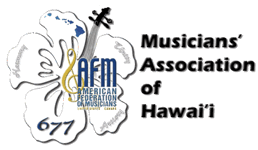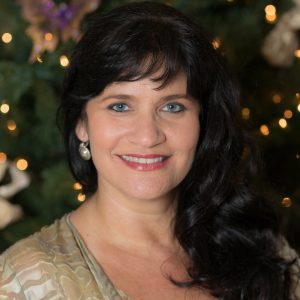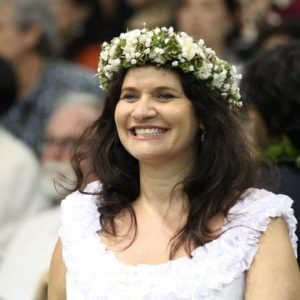A Song that Needs Singing
“Have you wondered where
Your road will lead you?
Maybe to a song that needs singing
Or a summer rain…”
— “Follow Your Road,” Seawind
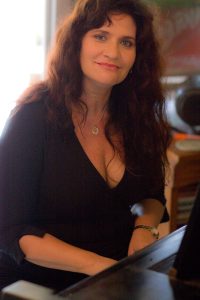
Roz Catracchia always tries to lead with love, whether she’s matching the music in her head with her heart, or gently encouraging new students to sing their song with unabashed joy.
Two-time Nā Hōkū-nominated singer-songwriter. Po’okela Award-winning musical director-composer. Daughter of the late, great Beebe Freitas — prolific, prima vista pianist, Hawai’i Opera Theatre rehearsal accompanist, and nurturer of young, upcoming musical minds.
Roslyn (Roz) Catracchia has spent a lifetime trying to find her own path, a soft, inspiring place to land…to lead with love and a song in her heart…much like her mom did for so many singers and musicians under her tender care.
To hear the Class of ‘82 Punahou alumna tell it, she has a long way to go. But her smooth, sweet, supple voice, a voice made for Broadway, says different.
Just listen, as she breezes over love, life, and hope — in her own recordings and famous musicals from near and far
Her burgeoning career hit musical gold at the Honolulu Theatre for Youth, with a creative, heaven-sent pairing that resulted in the soundtrack of our lives, putting Hawaii on the theatre map to boot. That’s Catracchia behind the notes, and that is the late Lisa Matsumoto spinning pidgin-English fairy tales, circa the 1990s+: “Once Upon One Noddah Time,” “The Princess and the Iso Peanut,” “Happily Eva Afta,” “On Dragonfly Wings,” among others.
Catracchia has written the songs and scores for over 40 productions (and counting) in Hawaii, and musically directed over 100 productions, including “Godspell,” “Joseph and the Amazing Technicolor Dreamcoat,” and “Noah — The Musical” at First Presbyterian Church of Honolulu, where she served as a pianist and director of worship and performing arts for 27 years.
When she isn’t revving up a cast in some musical about town or teaching private voice students — she used to lead Punahou’s Senior Sing commencement from 2004-2021 — Catracchia’s catching lyrical inspiration from her dreams, turning them into original, award-winning, popular recordings that could play side by side with the Broadway babies…and gigging when she can.
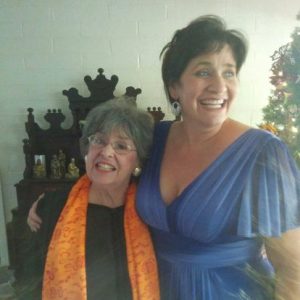
Roz may not realize it, but she takes after her pianist mom in many ways, the kindness, the fun, the inspirational.
“I’m no longer leading the Punahou Senior Sing,” she explained. “…I stepped down after the 2021 graduation to focus more on two new original musicals I’ve been working on, which will be hopefully making their debuts in 2025. I’d love to do it again in the future when my schedule settles down, but it was pretty all-consuming for April/May each year.”
Like the 1979 Seawind song that played at everyone’s graduation, Roz Catracchia just may have followed her road after all…“to a song that needs singing”…carving out an historic legacy to call her very own.
Let’s see what she has to say…
Reading about you and your mom Beebe Freitas, and your impact on the music scene is like opening a pile of gifts on Christmas morning. There’s so much to discover.
Your mom…amazing woman, well-known locally for her warm personality and devotion to the singers and pianists she coached one-on-one and the choirs she accompanied during performance rehearsals. She made learning and playing music fun, because she herself had fun. She also didn’t seem to care about chasing fame, like so many in the music industry, once turning down a chance to accompany a choir set to perform at the late President John F. Kennedy Jr.’s funeral — in order to plan her wedding and honeymoon.
How much of your mom do you take with you in your own musical journey?
Ahhhh, that’s an emotionally loaded question because today [Aug. 28] is her birthday. She passed away six years ago, and we were very, very close. She was a major part of my musical journey. She did indeed make music fun, and I needed the learning to be fun, because I was not a fan of practicing! So while we tried the whole mom being my teacher thing, that lasted just about one day. But! What worked wonderfully was my taking piano lessons from other teachers and mom helping me to practice. She made practicing an adventure! She would make up stories as I played the same musical phrases over and over, and I wanted to see how the stories unfolded, and the only way that would happen is if I kept playing past my mistakes. Whether I am teaching one person or 400 people, I try to always keep it fun and to hopefully get people to learn without thinking it’s hard work.
Your father and brother went in a different direction in their line of work. Why music for you? Was that your mother’s influence?
My mom never urged or pushed me into a music career. She supported me and my brother to be anything we wanted to be. I actually tried to have my line of work be just about anything other than music, because with her as my example of a working musician, I knew I wasn’t good enough. I’d never come close to my mom’s musicality. I thought about and pursued being a math teacher, an oceanographer, an executive secretary, to name a few of my options, but I kept getting sucked back into songwriting.
So songwriting, not just being a pianist/singer, is my passion. But playing music written by other composers is not. I’m a horrible, absolutely horrible sight-reader, and I demolish classical pieces (as in playing all the real notes on the page). I grew up watching my mom play alongside amazing, world-class musicians. You put a piece of music in front of her that has more black notes than white on the page, and she could play it all, note for note. Not me. I musical-direct shows that I love, and I musical-direct them, so I can learn from them. But I work hard, and yes, practice, to be ready for rehearsals.
I’m a songwriter at heart. And I remember the day I learned, that while my mom and I were very different, that maybe, I could maybe, just mayyyybe still be a working musician, even if I’ll never play the piano nearly as well as she could. At the time, I was 16 years old, and my mom’s colleague, Tom Boyd, who played oboe for the Honolulu Symphony back then, took me to Pierre Grill’s recording studio, Rendez-Vous Recording, to record some songs I had written. Mom, Tom, and I, and a few of my high school friends who could sing came with me. And as we laid down one track after another, I was in heaven. I finally got to hear out loud what had previously only been inside of my head. I didn’t want to leave Pierre’s studio. Before that day, I had told my mom, “If you could only hear the sounds in my head!” But in the studio, with my laying the basic tracks, and her fingers and Pierre’s fingers playing the strings and everything difficult on the piano and synthesizer, she could finally hear what I heard inside my head. And when we got home, she said, “Now I see what you mean…” My fingers can’t do what hers can. I wish they could. It makes me question myself constantly.
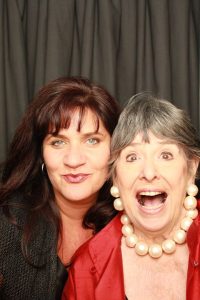
For the longest time, Roz worried she might never live up to her mom Beebe’s musical power. She didn’t have to; Roz carved out a career of her own as a songwriter — her mighty, mighty passion.
What did you admire most about her growing up?
When I was a kid, I didn’t know she was something amazing. She was just my mom. I was thankful that she would play our Christmas and May Day programs at Aina Haina Elementary School. And it was so fun going to rehearsals with her for the Honolulu Symphony or at DHT. But I didn’t realize she was amazing or start to admire her until late in my teen years. I watched her practice hard, oftentimes until her fingers bled on the keys. She never complained or mentioned it, she’d just grab a Kleenex and wipe it up, throw on a Band-Aid and start practicing again.
What I’m most thankful for, growing up, is that she made our home a welcoming place for everyone, including all of our neighborhood friends. At her memorial service, many people wrote to me and my brother John telling us how mom made them feel special and that they always felt welcomed in our home. I’m forever thankful for that.
And as I got older, what I admired about her was that she made music with some of the most gifted musicians in the world, like Leonard Bernstein, Arthur Fiedler & the Boston Pops, Yo-Yo Ma, I could go on and on…often meeting them through the symphony or through the Kapalua Music Festival or Hawai’i Opera Theatre, and she just thought of them as colleagues and friends. And if you worked on a production with her and were a soundman or set designer or costume designer, you were just as important as the conductor or the special guest artist. She made everyone feel special.
Who else inspires you in your musical career?
Stephen Schwartz, Stephen Sondheim, Stephen Bray (I guess all the Stephens!), the Indigo Girls (for their gorgeous harmonies), Kate Bush, but it was Jane Siberry, who I heard for the first time when I was 21 years old, who changed my life. When I first saw her live in concert, I thought, “She sings my life! I think I can do this.” And her voice and her performance art concerts were so off-the-wall, so different…she mesmerized me. And I thought, THAT is what I want to do. I’ve gotta try. She definitely made me brave to try to give it a go as a professional musician.
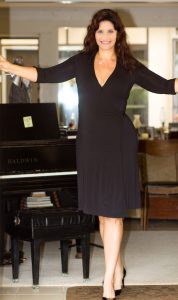
A pianist, lyricist, and musical composer, Catracchia can’t help but play what she loves, feels, and dreams.
In a Jan. 14, 2009 gigi-hawaii blog post, you’re quoted as saying that “Songs come from God. Be quiet to find the songs within,” and that you often dream in music, waking up and writing down what you hear. Can you elaborate on that and how music inspired you to find your own unique road?
I do believe the music and songs I write come from God, come from some place mysterious that I don’t know. And it is so much easier to hear the song if I’m very quiet myself. And yes, I often dream of a song or a melody in the middle of the night. Sometimes it feels familiar and solid, like it already existed before the dream, so familiar that I think, certainly I’ll remember that in the morning. But I’ve learned the hard way that if I don’t get up and record it or transcribe it, no matter what time of day or night, it will be gone, like poof! And that is a sad morning. But yeah, poof! So I wake up and sing it into my phone or scribble it down. I also find music flows to me when I’m in the water, in the ocean or a swimming pool or even taking a bath.
Finding my own unique road — Mmmmm. Yeah, it’s still scary, and I’ve been a professional musician for almost 40 years now. I wish so much that I had my mom’s agile fingers!!!! If I did, I feel there would be nothing stopping me from anything!! But I’ve got my hands and my mind, and my heart, and these are the things I have to work with. So…my own unique road? I try to be brave daily. And I try to inspire others to be brave daily. Especially young kids who are trying to find their voices.
When I was 12, I was teased by a boy when I sang “Let There Be Peace On Earth” under the banyan tree at an Aina Haina Elementary School assembly. That stopped me from singing out loud until I was 21. That was nothing but wasted time. So now, I try to make every musical I work on, every student I work with, have a safe space to make music, and make mistakes big without fear of being teased. I do believe that’s a goodly part of my purpose on earth.
You’re a long-time fixture in the music scene, but a fairly new member of the Musicians’ Association of Hawai‘i (of about two-three years). What made you want to join? How has membership benefitted you as a working musician and what would you say to other musicians who may not know how much this organization helps?
Robert Shinoda and Diamond Head Theatre were the deciding factors. Robert made it seem reasonable and wise. And Diamond Head Theatre required it. So basically, if I wanted to musically direct “Jesus Christ Superstar,” and that was indeed on my bucket list, I needed to join. And I’ve found it to be a very supportive organization, serious about supporting its members and offering space for us to practice (something that is very hard to come by here on our small island). I’m still learning more and more about the Musicians’ Association of Hawai’i each year, am finding more and more things to like about it, and have encouraged others to join, even covering the initial membership fees for a couple of people whom I respect who weren’t sure if they wanted to join, and if they liked it, they’d take it from there. I think they’re still in [smiles].
You started working as a composer for the Honolulu Theatre for Youth, and soon became the soundtrack behind the late Lisa Matsumoto’s groundbreaking pidgin English musicals (“Once Upon One Time,” “Once Upon One Noddah Time,” “Once Upon One Kapakahi Time,” “On Dragonfly Wings,” “Happily Eva Afta…”). What led you to join forces with her? What was that time like? What did Lisa like about what you did with her stories, musically?
I met Lisa my senior year at UH. We were in the musical, “A Funny Thing Happened on the Way to the Forum.” We were both playing courtesans, and we often got to Kennedy Theater early, stayed late, and sang songs in the pit at the piano. I started playing her some of my original songs and she was just starting work with Tammy (Hunt) Montgomery to produce “Once Upon One Time.” But I was moving to New York to try to make it in music that very summer, so the timing wasn’t right.
I did move to New York, worked at Sony Music, met a lot of people, and right around the time [the temperature] turned one…one degree (my nose was bleeding, my fingers frozen, my toes frozen, I remember that moment like it was yesterday) — I looked up at the display that said it was ONE degree, and I thought, WHAT in the world am I doing here?! Hawaii is 74 degrees at this very moment. I lasted only seven months in New York, moved back to Hawaii and recorded my first CD, The Wishing Tree, which received a Hōkū nomination. Soon after that, Lisa and I reconnected, and I began working with her on the songs for the second show in her “Once” trilogy.
Lisa and I clicked from the start. She told me what she wanted the song to be about, and I thrived on giving voices to characters. Another important person in the equation is David Kauahikaua, however. Because he could bring the orchestrations to life like my mom did in Pierre’s studio that first time. I just had to be clear to let him know as much information as possible…in advance. For example, there was one year I had written a song and gave him the lead sheet and my piano/vocal demo. He made a gorgeous arrangement of it, but it didn’t sound Japanese. And he said, “Why does it need to sound Japanese?” And I said, “Because the whole scene takes place in a Japanese tea garden.” He looked at me, took a deep breath and said, “If you had said it was in a Japanese tea garden, I would have made it sound like it was in a Japanese tea garden!” I’m smiling so big remembering that conversation. Since then, I am certain to give him more details than necessary when describing what I’m hoping the arrangement will sound like.
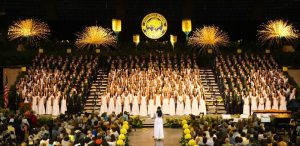
Chicken-skin moment at a Punahou School commencement, where seniors perform together, in perfect, four-part harmony under Catracchia’s guidance.
You’ve also composed and directed other musicals, such as “Noah — The Musical,” “Gridiron” at Diamond Head Theatre, “Joseph and the Amazing Technicolor Dreamcoat,” and “Godspell.” God plays a central role in your life, infusing your music with a special power, significant dynamic, inspirational poignancy. What has He done in your life and for your music?
Everything. Period. I can’t imagine my life without God. There is so much I don’t know about, so much, but what I do know and believe is that God is love, infinite love, and infinite creativity. Madeleine L’Engle in her book, “Walking on Water (Reflections on Faith and Art),” helps me to put into words my feelings on the matter. She says, “And as I listen to the silence, I learn that my feelings about art and my feelings about the creator of the Universe are inseparable. To try to talk about art and about Christianity is for me one and the same thing, and it means attempting to share the meaning of my life, what gives it, for me, its tragedy and its glory. It is what makes me respond to the death of an apple tree, the birth of a puppy, north lights shaking the sky, by writing stories.” That’s Madeleine L’Engle. And for me, I respond by writing poetry and songs.

Most rewarding is when graduating Punahou seniors go from reluctant singers to proud, jubilant ones.
Besides providing the music behind the musicals, you also sing on your own and in several original recordings, two which were Nā Hōkū-nominated (The Wishing Tree, Stepping Stones). Your voice is strong and sweet, a velvety bridge between adult contemporary-gospel and Broadway leading lady — “Thinking” could be on the next “Frozen” soundtrack. What have been some favorite memories from gigs and recordings past? What else do you see yourself doing?
Oooh, fun!! A favorite memory was when I was singing in Thomas Square Park. There were so many people coming and going. But one person stood leaning against a huge tree. She had her arms folded in front of her, and she was smiling. I knew that one person was enjoying songs I had written.
Another favorite memory is conducting Punahou graduation and baccalaureate ceremonies. I love the challenge of getting 400 students to learn and memorize eight songs in four-part harmony in eight weeks. And the best is when you see them turn from thinking of it as a chore to being excited about singing and making that “wall of sound!”
Oh, and thank you thank you for thinking that “Thinking” could be on the next “Frozen” soundtrack! That makes me smile big!
You wear many hats. What would you most like to be remembered for?
Mmmm. Another great question. I have a two-part answer:
The first part is I hope to be remembered as one of the fun teachers. I hope I have inspired and encouraged people to sing out from their hearts, to not be afraid to not sing perfectly. Sing! Make mistakes big, learn loud, and have fun! I think singing is supposed to be something everyone does. Everywhere.
And the second part of my answer is something I’ve been thinking of more and more the older I get. I’d like to be remembered for leading with love. I make mistakes all the time. But I strive to lead with love.
What is your ideal day?
My ideal day…
I wake up without an alarm.
I lazily sip a cup of coffee (with cream), looking out my window at a lovely Maxfield Parish kind of a sky.
Then I take a walk at Sandy Beach, ending up at the tidepools, and hang out there for a goodly while, smiling and splashing about on a perfectly sunny day.
Then I take a cool shower, head home, write a song or a scene for a new musical that has yet to see the light of day on a stage, have lunch with a friend, teach a few private voice lessons, do something awesome and terrifying, like work with 400 graduating seniors who don’t think they want to be there, but I somehow make them have fun, while teaching them yet another new song.
Then I have dinner with a friend, hopefully while watching a sunset.
And at night, when my head hits the pillow, I don’t have to set an alarm.
That would be a pretty perfect day.
This interview took place in late Aug./early Sept. 2024.
— Carol Banks Weber, with Roz Catracchia
Enjoy Roz at her best in these YouTube videos below, as well as the magic her mom, the late Beebe Freitas, brought to everyone’s performances:
- “Better Than I Ever Thought It Could Be [On This Journey]” for Roz’s brother and his bride on their wedding day
- With First Presbyterian Church of Honolulu and HISessions in a special holiday presentation a few years back
- Beebe Freitas accompanied singers and choirs throughout her life, making music fun and worthwhile. She talks about her passion in an April 24, 2014 PBS Hawaiʻi “HIKI NŌ” episode.
From the Fall 2024 issue, Ke Ola O Na Mele
